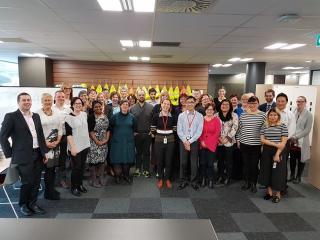- Home
- News
- Screening Matters, Issue 59, August 2017
- First District Health Boards start bowel screening
News
- Screening Matters Newsletter
- April 2019
- April 2018
- December 2017
- August 2017
- April 2017
- December 2016
- October 2016
- March 2016
- November 2015
- August 2015
- June 2015
- April 2015
- February 2015
- December 2014
- October 2014
- August 2014
- June 2014
- April 2014
- February 2014
- December 2013
- October 2013
- August 2013
- June 2013
- April 2013
- February 2013
Screening Matters
The National Screening Unit newsletter
In this issue:
- Engaging Māori wāhine in conversations: BreastScreen Counties Manukau
- Breast screening booklet demystifies mammograms: Northland DHB
- First District Health Boards start bowel screening
- Delivering quality screening and audiology services for babies
- Launch of Time to Screen social marketing programme
- New BreastScreen Aotearoa resources for women
- Breast and cervical screening support services for Otago and Southland
First District Health Boards start bowel screening

Residents in Wairarapa and Hutt Valley who are aged 60 to 74 and eligible for publicly funded health care are the first to be invited to take part in the free National Bowel Screening Programme (NBSP). Other District Health Boards will join in stages over the next three years.
The screening test, along with any further investigations (such as colonoscopy) and treatments organised within the public health system, is free for those eligible for publically funded healthcare in NZ .
Bowel screening is for people who have no symptoms of bowel cancer. It aims to save lives by detecting bowel cancer at an early stage, when it can often be successfully treated.
The Clinical Director of the National Bowel Screening Programme, Dr Susan Parry, says about 3,000 New Zealanders are diagnosed with bowel cancer every year.
“Bowel cancer is the second highest cause of cancer death in New Zealand. Every year, more than 1,200 people die from it.
“The introduction of the National Bowel Screening Programme is a significant step forward for New Zealand. Once it is fully rolled out, it is anticipated that the screening programme will initially detect about 500 to 700 cancers each year. These are cancers which in many cases would have gone undetected until a later stage, when the chances of successful treatment are much lower.
“There’s also an element of prevention. For those who go on to have a colonoscopy after a positive test result, the removal of polyps - or growths - during this procedure can prevent cancers from developing in the future.
“Those eligible to take part will be sent a personal invitation letter, a consent form and a free bowel screening test kit. Eligible participants should receive their invitation within two years of the programme starting in their DHB area. They’ll then be invited to take part in regular screening every two years.
“I would like to encourage people to do the test, but to talk to their doctor now if they have any bowel symptoms that they’re worried about. Common symptoms of bowel cancer can include blood in your bowel motion, or a change in your normal pattern of going to the toilet that continues for several weeks. Although these symptoms are usually caused by conditions other than cancer, it is important to get them checked out.”
Information on the National Bowel Screening Programme is available at www.bowelscreening.health.govt.nz.
To receive the Screening Matters newsletter by email, fill out our sign-up form.

